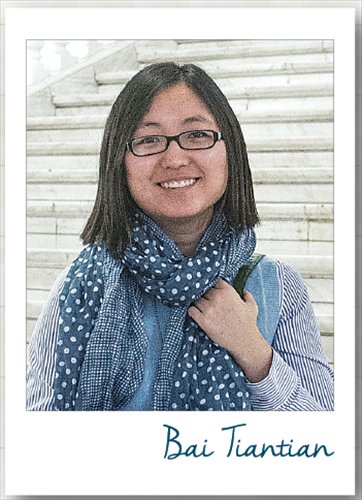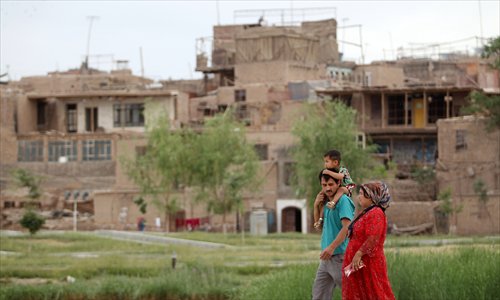HOME >> CHINA
Respecting diversity
By Bai Tiantian Source:Global Times Published: 2014-12-29 20:48:01
Investigating the divisions and kinships in Xinjiang society


A Uyghur family walks through the old section of Kashgar, Xinjiang Uyghur Autonomous Region on May 30, 2014. Photo: Cui Meng/GT
I landed in Urumqi, the capital of Xinjiang Uyghur Autonomous Region, in early May, shortly after a bombing at an Urumqi train station.
I was on assignment to report the terror attack, the motive behind it and the aftershock felt by the community.
For me, Xinjiang is a distant land. I have no friends or relatives from the area and had no personal ties with a Uyghur before this trip.
I felt like an outsider during my entire stay.
But I talked to as many locals as I could, and constantly observed. I watched locals chat on the bus, street vendors barbecuing lamb skewers and shoppers browsing head scarves. Yet I felt I knew nothing about them.
While reporting on the attack had its challenges, the real difficulty was understanding the reasons behind the bombing and predicting its consequences.
In the middle of my trip, I received a call from my editor, who asked me to report on passport policies for Uyghurs.
My interviews were unfruitful; I was shuttled between departments and passed off between officials.
Feeling dejected, I was sitting in the exit and entry office of the local police when I met Patigul (Pseudonym), a Uyghur woman working at a local hospital who was waiting to receive her passport.
Of all the Uyghur women I have met, Patigul, who has a master's degree from a local medical school, ranks among the most educated. Her father passed away many years ago. Her mother, a strong Uyghur woman, raised three children on her own and worked very hard at a local factory to make sure her children had received the best education she could provide.
"Things were different when my children were little," Patigul's mother said. "I would leave my kids at my ethnic Han neighbor's apartment when I worked a night shift. My Han neighbor's children also ran in and out of our apartment and frequently dined with us."
"But after the attacks, people grew more defensive and always kept themselves on guard," she said.
Patigul's family has always been close to ethnic Hans. For years, Patigul's younger brother has been sponsoring a poor Han family in their community, bringing them flour, oil and other daily supplies. Patigul's mother showed me a picture of her son receiving an award from the district government for his deeds. However instead of pride, she expressed concern.
"Other Uyghur people are calling us traitors. They ask us, 'Why do you help the Hans but not your own people? Are you not one of us?' My son believed that he was doing good but the others, some of our relatives included, think otherwise."
Patigul's family is not alone when it comes to pressure from Uyghur society. In southern Xinjiang's Hotan, the number of young Uyghur Party members is drastically declining.
"Joining the Party would mean to give up their Islamic belief. Many people feel that's unacceptable. Even if they do, the amount of pressure from the Hotan community, which is one of the most conservative in the region, would make it impossible for them to carry on their work," a source close to the matter said.
The Communist Party of China is officially atheist and requires its members to conform.
Like many other Uyghurs I have met, Patigul's mother felt that the more important job positions are controlled by the Hans and Uyghurs are at a competitive disadvantage.
In our conversation, she repeatedly mentioned that no matter how hard her son works, promotions always go to his Han coworkers.
Some Hans I met also said they feel mistreated.
"Government policies are tilted toward the Uyghurs. The score requirements for Uyghur students to get into a first-tier universities are much lower than those for Han students in Xinjiang. Local Uyghur officials have better chances of getting promoted than their Han coworkers. Even Uyghur criminals are treated with more leniency, as authorities often fear a harsh verdict might incite 'ethnic conflict,'" said a local Han official from Aksu prefecture.
Travel in the region has become a nuisance for everyone.
Flights in and out of Xinjiang require extra security checks.
IDs for Xinjiang residents, which usually start with the number 65, are more closely scrutinized at hotels and transportation stations.
Anxiety has been quietly growing, and frequently surfaces online.
Reporters are extremely careful not to imply that there is a connection between terrorists and Xinjiang in order to avoid enraging Xinjiang readers.
One Weibo post in December that read "Xinjiang thieves stole my bag" was severely criticized as angry and defensive Xinjiang netizens lashed out, asking "Are there no thieves in other parts of China?!"
Both Hans and Uyghurs living in Xinjiang see themselves as victims of the terror attacks, while the rest of the nation labels them as perpetrators.
In my days in Urumqi, when I was not out interviewing people, I spent a lot of time wandering in the Uyghur communities.
I went shopping at a bazaar where the wife of a scarf merchant from Hotan, whose was covered head to toe by a black gown, taught me how to properly tie a head scarf, or hijab. I learned the correct way to wear a Uyghur hat, and picked up a few salutations in Uyghur.
I began to admire the good qualities in Uyghurs.
Rich or poor, the Uyghurs I saw dressed properly and looked dignified. They respect their elders and follow their traditions.
The local government has been trying to stop the city from becoming segregated by discouraging Han from selling their properties and moving from Uyghur communities. But many still leave.
I asked Patigul's mother what has been the biggest impact of the terror attacks on her life.
"People stop trusting each other. Not only just Hans and Uyghurs. Uyghurs stop trusting each other," she said.
Posted in: Society